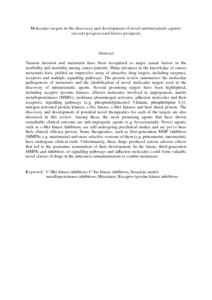Citation
Wong, Mei S. and Mohd Sidik, Shiran and Mahmud, Rozi and Stanslas, Johnson
(2013)
Molecular targets in the discovery and development of novel antimetastatic agents: current progress and future prospects.
Clinical and Experimental Pharmacology and Physiology, 40 (5).
pp. 307-319.
ISSN 0305-1870; ESSN: 1440-1681
Abstract
Tumour invasion and metastasis have been recognized as major causal factors in the morbidity and mortality among cancer patients. Many advances in the knowledge of cancer metastasis have yielded an impressive array of attractive drug targets, including enzymes, receptors and multiple signalling pathways. The present review summarizes the molecular pathogenesis of metastasis and the identification of novel molecular targets used in the discovery of antimetastatic agents. Several promising targets have been highlighted, including receptor tyrosine kinases, effector molecules involved in angiogenesis, matrix metalloproteinases (MMPs), urokinase plasminogen activator, adhesion molecules and their receptors, signalling pathways (e.g. phosphatidylinositol 3-kinase, phospholipase Cγ1, mitogen-activated protein kinases, c-Src kinase, c-Met kinases and heat shock protein. The discovery and development of potential novel therapeutics for each of the targets are also discussed in this review. Among these, the most promising agents that have shown remarkable clinical outcome are anti-angiogenic agents (e.g. bevacizumab). Newer agents, such as c-Met kinase inhibitors, are still undergoing preclinical studies and are yet to have their clinical efficacy proven. Some therapeutics, such as first-generation MMP inhibitors (MMPIs; e.g. marimastat) and more selective versions of them (e.g. prinomastat, tanomastat), have undergone clinical trials. Unfortunately, these drugs produced serious adverse effects that led to the premature termination of their development. In the future, third-generation MMPIs and inhibitors of signalling pathways and adhesion molecules could form valuable novel classes of drugs in the anticancer armamentarium to combat metastasis.
Download File
![[img]](http://psasir.upm.edu.my/29722/1.hassmallThumbnailVersion/Molecular%20targets%20in%20the%20discovery%20and%20development%20of%20novel%20antimetastatic%20agents.pdf)  Preview |
|
PDF (Abstract)
Molecular targets in the discovery and development of novel antimetastatic agents.pdf
Download (147kB)
| Preview
|
|
Additional Metadata
Actions (login required)
 |
View Item |

